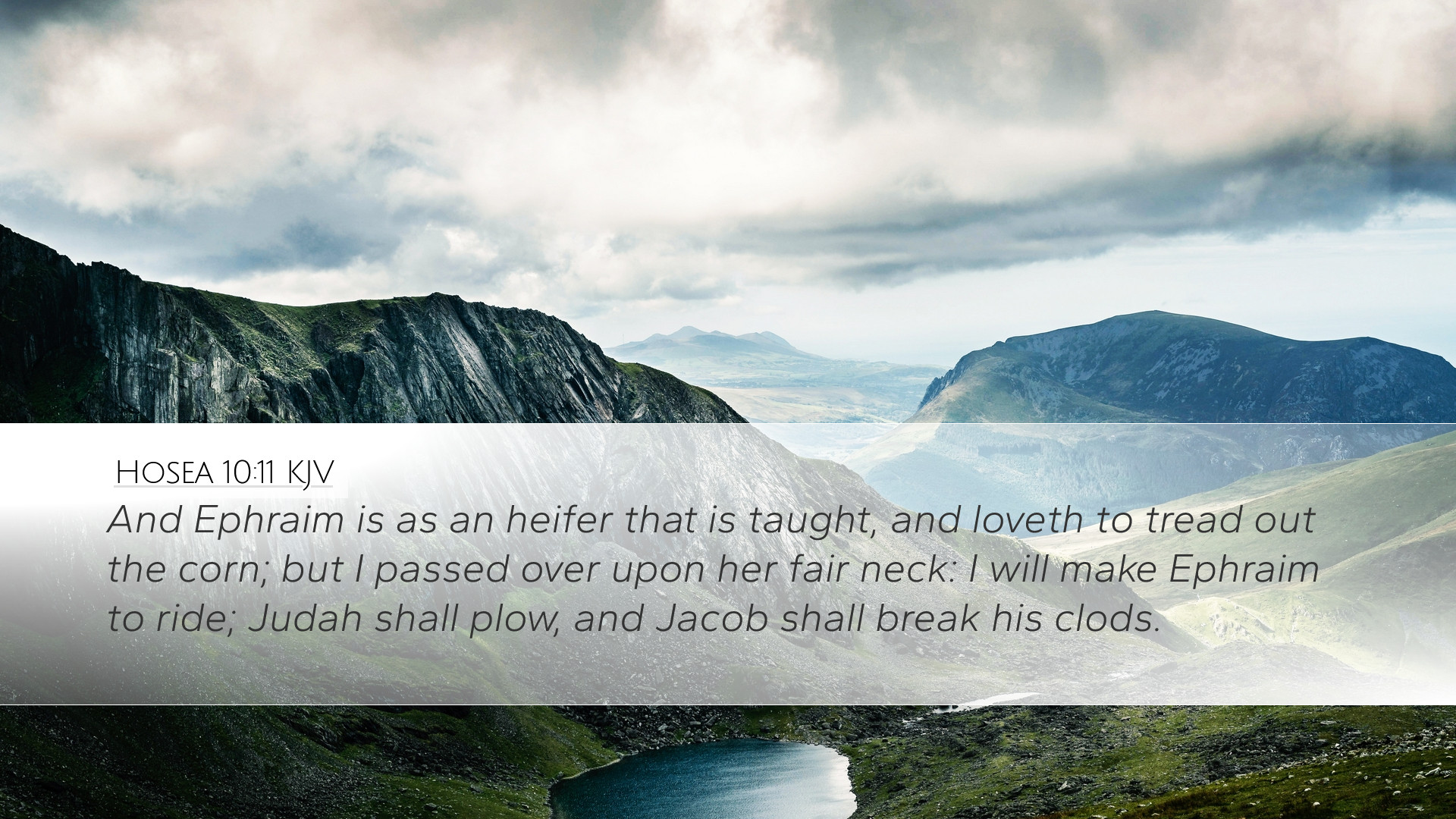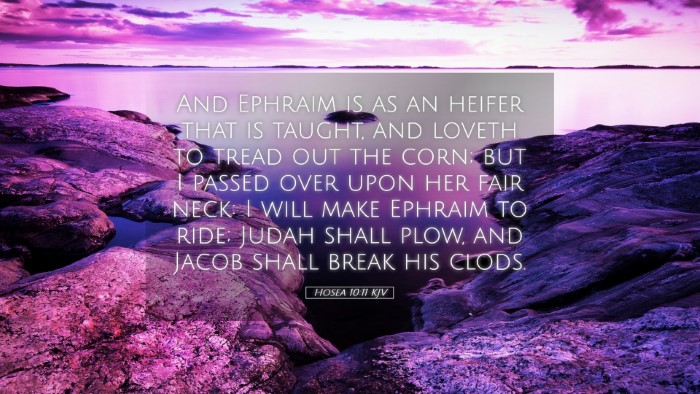Old Testament
Genesis Exodus Leviticus Numbers Deuteronomy Joshua Judges Ruth 1 Samuel 2 Samuel 1 Kings 2 Kings 1 Chronicles 2 Chronicles Ezra Nehemiah Esther Job Psalms Proverbs Ecclesiastes Song of Solomon Isaiah Jeremiah Lamentations Ezekiel Daniel Hosea Joel Amos Obadiah Jonah Micah Nahum Habakkuk Zephaniah Haggai Zechariah MalachiHosea 10:11
Hosea 10:11 KJV
And Ephraim is as an heifer that is taught, and loveth to tread out the corn; but I passed over upon her fair neck: I will make Ephraim to ride; Judah shall plow, and Jacob shall break his clods.
Hosea 10:11 Bible Commentary
Hosea 10:11 - Commentary
“And Ephraim is as an heifer that is taught, and loveth to tread out the corn; but I passed over upon her fair neck: I will make Ephraim to ride; Judah shall plow, and Jacob shall break his clods.”
This verse from Hosea provides rich insights into the character of the people of Israel, particularly Ephraim, and God's dealings with them. The agricultural metaphors employed reflect the agrarian culture of ancient Israel and serve to illustrate profound spiritual truths.
Contextual Analysis
The book of Hosea, a prophetic work written during a time of moral decay and impending judgment in Israel, highlights the nation's infidelity to God through the metaphor of a marriage relationship. Ephraim, representing the northern kingdom, symbolizes unfaithfulness while Judah represents the southern kingdom.
1. Ephraim as a Thoroughly Conditioned Heifer
The imagery of an “heifer that is taught” suggests a gentle, spoiled animal that enjoys the ease of tread. Matthew Henry notes that Ephraim, like the heifer, has been trained to work in comfortable conditions, yet this leads to a complacent attitude toward its duties.
Albert Barnes elaborates on this by asserting that this representation implies Ephraim’s inclination towards sin and pleasure, placing loves of earthly gain over spiritual engagement. There is a warning embedded here about the dangers of prosperity without obedience to divine standards.
2. The Consequence of Divine Control
The phrase “I passed over upon her fair neck” denotes God's authority over Ephraim—signifying His dominion and control. Adam Clarke interprets this as God's direction over the nation; however, it may also imply a shift towards punishment due to their obstinate ways.
This line positions God as both caretaker and judge, reflecting His intimate relationship with His people while preparing them for correction; that correction will come through the agency of Judah, who will be called to action.
3. The Role of Judah and the Unity of the Tribes
“Judah shall plow, and Jacob shall break his clods” denotes a shifting of roles and responsibilities among the tribes. Matthew Henry comments on this transition, emphasizing the contrast between Ephraim's idleness and the active labor of Judah. This indicates an impending judgment where Judah assumes the role of responsibility while Ephraim faces the consequences of its negligence.
Albert Barnes adds that the call to Judah serves as a reminder of the cooperative nature of God’s people, reinforcing unity amidst division as a strategy for restoration.
Theological Implications
1. Divine Sovereignty and Human Responsibility
This verse represents the complex interplay between God’s sovereignty over nations and the individual responsibility of people. While God decides the fates and roles of each tribe, the choice of their actions ultimately determines their blessings or judgments.
2. God’s Desire for Transformation
God's intent is not to destroy but to transform. “I will make Ephraim to ride” signals a hopeful future if Ephraim repents, illustrating God's readiness to redirect them on the right path, should they heed His warning.
Adam Clarke remarks that God’s involvement signifies an offer of grace amidst correction—a willingness to lead His people towards repentance and a right standing with Him.
Practical Applications for Today's Believers
- Spiritual Vigilance: Believers must not become complacent in their walk with God, just as Ephraim did under the comforts of prosperity.
- Responsibility in Community: The roles within the Body of Christ necessitate an understanding of our contributions toward communal spiritual welfare.
- Response to Correction: Just as God aimed to correct and redirect Ephraim, modern believers must respond positively to divine guidance, which often comes through challenging circumstances.
- Embracing God’s Authority: Recognizing God’s hand in governance and guidance can empower individuals and communities to navigate through trials with confidence.
Conclusion
The messages within Hosea 10:11 resonate deeply with themes of divine authority, accountability, and transformation. For pastors and theologians, this passage serves as a reminder of God’s continual call for His people to return to faithfulness, reflecting on how His loving correction can lead to restoration. The rich agricultural metaphor encourages believers to engage actively in their faith, remain vigilant against complacency and recognize the call to cultivate a life that honors God.


